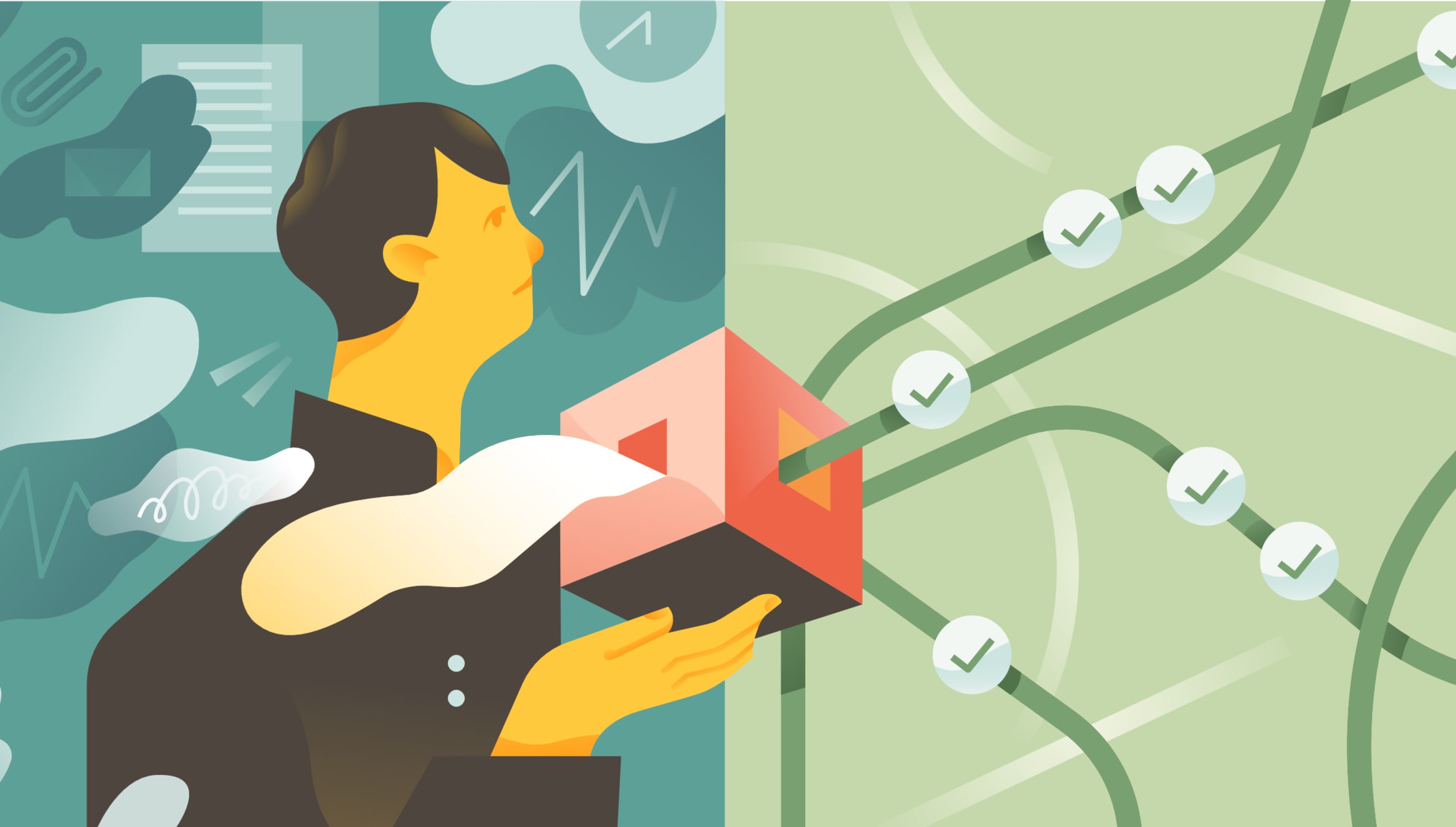Todoist makes the world’s #1 task manager to organize your work and life. Tell me more
My name is Amir Salihefendić, and I’m the founder and CEO of Doist, the company behind Todoist. I want to share a system I’ve perfected over the past 15+ years that has helped me achieve my goals while reducing my stress. I like to think of it as a simplified GTD built for the modern world.
The truth is that most people don’t use a personal productivity system. They wing it and hope for the best. But our work, personal lives, and the world we live in are too complicated to just hope that all the balls we’re juggling will stay in the air. A reliable system can help you prioritize the important things and juggle many things at once without feeling overwhelmed.
I first came up with Systemist and started building Todoist in 2007 while at university. I was living in a dorm room in Aarhus, Denmark, studying computer science. On top of a full class load, I also had a lot of personal projects and two part-time jobs. As a result, I was unorganized, stressed out, and barely able to keep up. I knew I needed a system to manage my life. That’s where Todoist and Systemist were born. Since then, I’ve used this system to build a fully remote company of over 70 people and create a platform that has helped millions of people accomplish some pretty amazing things.
Systemist has enabled me to:
Scale a company to 100 people and juggle many different responsibilities as founder and CEO without feeling overwhelmed. I don’t think anyone inside the company has ever seen me stressed.
Work and prioritize the highest impact things each day.
Always remember to follow up on important items like emails, meetings, or projects.
Enjoy things outside of work like spending time with my beautiful wife and three incredible children, traveling, self-education, and health-related things such as sports. This balance and self-care helps me be a more effective leader for my team.
My system works best with Todoist, given that I built the app around it, but it can work with most other productivity apps as well. The principles of the system are much more important than the actual tools you use.
I hope this can give you some inspiration for creating your own system. Ultimately, it’s all about creating a personal workflow that best fits your needs.
Try Systemist if you...
Are stressed and overwhelmed by the amount of stuff you need to keep track of
Have a hard time prioritizing high-impact tasks while also staying on top of the little things
Love the satisfaction of reaching inbox zero
Found GTD way too complex to maintain over the long-term
Systemist has 6 simple components:
1. Take it everywhere
A productivity system is only useful if you can access it everywhere you are. We’ve invested a lot into making Todoist available on as many devices and platforms as possible. If you haven’t done so, I would recommend installing Todoist (or another productivity app) on every device you have:
On your phone — iOS or Android
On your desktop — Mac or Windows
As a plugin for Gmail or Outlook (for adding emails as tasks)
As a plugin for Chrome, Safari, or Firefox (for adding websites as tasks)
Even on your smartwatch, if you have one
2. Capture everything
A productivity system is only useful if it captures all of the important things in your personal and professional life. This gives you the freedom to not stress that you will forget something important (for example, a follow-up with a client, buying a gift, etc.) It will also give you a complete overview of what you need to do.
Here are some of the things I capture as tasks:
Follow-ups I need to do, which could be with external people or within our team
Complex projects that have many smaller steps
A shared shopping list with my wife
Emails if I can’t answer them right away (I use the Todoist Gmail add-on, which works whether you’re accessing Gmail from the web or via mobile app.)
A list of upcoming product releases shared with my coworkers
Recurring tasks to periodically check in on long-term projects we’re working on
Websites that include things I can’t do right away. This could be adding an Amazon item I want to buy, adding an IMDB movie to my movie list, or saving articles to read later (via Todoist for Chrome)
A “hiring” project of people we want to hire
Bug reports that are related to me
Health-related tasks (for example, weekly gym and running sessions)
Basically, everything I need to do is inside my system!
Add tasks faster
Discover [11 fast ways to get tasks out of your head and into your Todoist](https://todoist.com/inspiration/add-tasks-todoist), including voice commands, automations, homescreen shortcuts, and more.
3. Break it up into small, actionable tasks
Small tasks are easier to complete than big ones, so break big tasks into a number of smaller sub-tasks that can be completed in one hour or less. This will allow you to estimate the total time involved more accurately. Plus, you’ll see progress as you check things off.
It’s also very important to make tasks specific and actionable. You should be able to complete everything you have in your to-do list. Don’t keep items that you can’t complete.
4. Prioritize
On a daily basis, I complete between 15 to 25 tasks, but some are much more important than others.
Here’s how I prioritize everything I need to get done on any given day:
I use due dates to specify when I want to complete something. I schedule low-priority tasks for the future. High-priority tasks are usually scheduled for today or tomorrow.
I use priority levels to prioritize daily tasks. This is super useful in the daily/weekly views, as Todoist will automatically put higher priority tasks first.
You can use labels to add even more prioritization. At Doist, everyone posts weekly snippets of the tasks they’re committed to completing that week. I add an @snippets label to those tasks in Todoist to know which tasks are my must-get-dones. I then have a filter set up to show me just my snippets tasks to make sure that I schedule and complete at least one per day.
5. Get to to-do list zero daily
Before using inbox zero for email management, my inbox was a mess. I felt horrible every time I had to process it. The same can be said for my to-do list.
That’s why I use a similar concept for task management: To-Do List Zero. At the end of every day, I aim to have zero tasks on my Today view.
Does that mean I complete everything on my Today view every day? I wish! There are always tasks left over at the end of the day that I postpone, but this isn’t a negative thing. I see it as an opportunity to take stock of where I’m at, re-evaluate my tasks, and re-plan them so I can start fresh and focused the next day. Todoist’s Upcoming view makes it easy to drag and drop tasks from one day to another, so my schedule is always balanced.
Adhering to To-Do List Zero keeps my system tidy, up-to-date, and, most importantly, manageable.
6. Get consistent feedback
Most productivity systems only focus on what you need to do and not what you’ve already done. Where’s the fun if you don’t celebrate progress or pause to evaluate how productive you really were?
That’s why we built Todoist Karma, a feedback system that gives you insights into your productivity and awards you for your accomplishments.
Todoist Karma tracks your progress, visualizes it, and gives you points. As a beginner, this system is quite fun since there are also levels involved, and you feel like you are progressing. It’s a mini-game that makes task management a bit more rewarding.
After you reach a certain level, Karma level-ups are fewer and farther in between. This is where goals and streaks become motivating! You can set goals for the number of tasks you want to complete each day or week. For every day or week you reach your goal, Karma adds to your streak. If you miss a goal one day, your streak gets reset to zero. This system is inspired by the Don’t Break the Chain method of habit-building.
While streaks seem simple on the surface, they can be a powerful motivator to make consistent progress every day:
Over the holidays, my 50-week streak on @Todoist Karma ended... 😩😩 TIP: Put it on "vacation mode" in settings pic.twitter.com/EFvgZLIA2I
— Francesco D'Alessio (@FrancescoD_Ales) January 4, 2016
Bonus tips for managing communication
Managing email
As I mentioned before, I follow Inbox Zero religiously! This is my email workflow:
I only check emails twice daily, once in the morning and once in the afternoon.
In each session, I try to process all the emails.
If I can, I respond to an email right away. If I can’t, I turn it into a task with a due date and priority via the Todoist Gmail add-on.
I have all notifications from my email disabled on all of my devices, so I won’t be distracted as I focus on other things.
Managing team chat
In our company, we use very little email. Most of our communication used to be done in Slack, but we found that Slack and other group chat apps can be huge productivity killers constantly interrupting you throughout the day.
Studies have shown that the average desk job employee loses 2.1 hours daily to distractions and interruptions. That adds up to over a full day of work every week!
Since then, we have built a thread-based, asynchronous messaging app called Twist to manage all of our internal team communication with more focus and fewer distractions. But no matter what tool your team uses, it’s important to have a system so that checking messages doesn’t take over your day.
Here’s how I do it with Twist:
I’m only online when I’m open to being interrupted. When I want to focus, I snooze all Twist notifications and don’t keep the app up on my desktop. I also have automatic snoozing set up at night and on the weekends.
Like email, I try to process new Twist updates in batches. I open the app a few times per day (maybe once an hour or so). Like email, I’ll add a Twist thread as a task in Todoist if I can’t take care of it right away.
I’ve disabled all notifications from communication apps, including Twist, on mobile.
I’ve been following this system for over a decade, and I credit it with keeping me focused, sane, and healthy. I believe that everyone is capable of achieving their goals, which is why I’m so passionate about helping people build their own personal workflows.
I hope this post inspires you to experiment and figure out what works for you. Best of luck!




